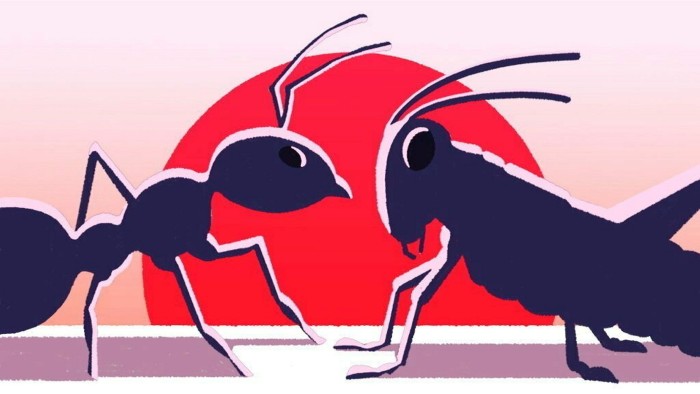Stay informed with free updates
Simply sign up to the Japanese business & finance myFT Digest — delivered directly to your inbox.
In Aesop’s fable, the grasshopper spends its summer singing, dancing and consuming. The assiduous ant toils away storing food, despite the grasshopper’s entreaties to join the fun. Winter descends. The ants have plenty; the grasshopper starves; the moral is so clear even an insect can get it.
Or is it? Are there circumstances where profligacy is forgivable, or do the ill-prepared deserve their fate? Does civilisation advance or stagnate when workers support a leisured class? Are the monopolist, resource-hoarding ants the real villains?
The trade and tariff crisis of 2025, for Japan in particular, presents a new set of ant-grasshopper dilemmas. Which of the two best describes corporate Japan as it walks the tightrope between China and the US? Which, as winter looms over the global economy and global order, is the better positioned arthropod? And which, as dismal deals are discussed and bad accommodations made, will investors decide to put their money on?
Corporate Japan, for some decades now, has tended to see itself as proudly antist — in many cases, actively celebrating its survivalist hoarding, rainy-day readiness and propensity for heavy toil. Its companies have, for the most part, been run conservatively, in a mindset of preparation for some unspecified crisis.
A cohort of investors have long seen this as excessive. More than half of the non-financial companies in the Topix index, according to Goldman Sachs, are net cash and a majority have a net cash balance equivalent to over 20 per cent of their equity value. They collectively sit upon a mountain of other assets primarily formed from non-core real estate and portfolios of shares in other listed companies. Investors have often grumbled about this but the collective behavioural shift has been slow.
Cash and stash, on several key occasions, has been king. Whenever winter has come, as it did in the form of the 2008 global financial crisis, the 2011 Tohoku earthquake and the 2020 pandemic, the relative financial robustness of Japanese companies has been cited as a vindication of antism. They survived, as did the philosophy.
The particular bleakness of this possible financial winter, though, could expose Japan as a behaviourally different animal. The breakdown of globalisation, the diminished reliability of Washington as an ally, the accelerated US-China decoupling stand to hit Japan hard and force it into value-destructive choices. There have been no signals that Japan will be spared heavy tariffs on automobiles, which means any general economic downturn will strike even harder.
But as the acuteness of the current danger has become more plain, so too has the argument that Japan has spent the past 20 years as a grasshopper masquerading as an ant — squandering the opportunities afforded by ultra-low interest rates, undemanding domestic investors, plentiful cash and various rounds of government stimulus while leaving itself unprepared for the more brutal chill of 2025.
Despite years of suasion from investors, Japanese companies enter this winter unfocused, and thus less easy to back. Research by Shrikant Kale, a quantitative strategist at Jefferies, found last year that the average Japanese company is exposed to 2.4 different industrial sectors, versus 1.5 for US and European peers.
Corporate Japan should have consolidated its highly fragmented industries sooner to create genuinely formidable global champions, nurtured a generation of professional chief financial officers to better manage balance sheets, digitised everything sooner, raised returns on equity, and fought to build a reputation as optimal allocators of capital when it could. Companies danced, in other words, when there was work to be done.
Some, including Andrew McDermott, a longtime Japan investor and president of Mission Value Partners, are convinced that Japan has quietly done enough ant work to thrive. Japanese companies, he points out, are now better placed to build things in the US than many American peers, who moved 4mn jobs out of the US even as the Japanese created nearly 1mn (mostly manufacturing) jobs there.
But the urgency with which the Japanese government is simultaneously pressing companies for digital transformation, consolidation and higher standards of corporate governance suggests that Tokyo now sees more grasshoppers than ants.
In 1934, as the New Deal was starting to address the Smoot-Hawley tariff debacle and the miseries of the Depression, Walt Disney reproduced the ant-grasshopper fable as a cartoon. In a finale that Japan may now need to replicate, kindly ants feed the grasshopper in return for a winter of remorseful, violin-based entertainment. “I’ve been a fool the whole year long . . . you were right and I was wrong,” he chirps.
leo.lewis@ft.com


